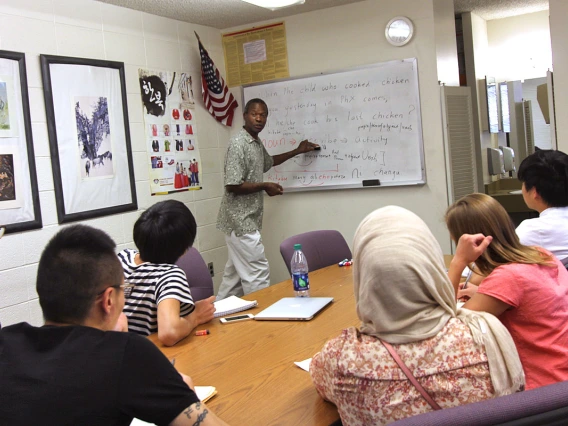
To meet rising student demand for language instruction, the University of Arizona's College of Humanities is introducing new minors in Korean and critical languages.
The Korean minor, with concentrations in language or culture, is offered through the Department of East Asian Studies. The Critical Languages Program, which began in 1988 to offer for-credit courses in less-commonly-taught languages, is expanding to offer a minor, giving students the opportunity for more intensive study of languages such as Cantonese, Hindi, Kurdish, Norwegian, Polish, Scots-Gaelic, Swahili, Swedish, Tagalog, Thai and Vietnamese.
"Both the Korean and critical languages minors give our students more opportunities to develop vitally important language skills and gain a competitive advantage on the global job market," said College of Humanities Dean Alain-Philippe Durand. "With these new programs, students from across the campus can build expertise in skills — intercultural competence, adaptability, critical thinking, problem-solving and collaboration — that will serve them well in any career."
About 300 students enroll in critical languages courses each semester, not including the Korean language classes, which had the largest enrollments. The languages and levels offered vary based on student demand, but about 17 are taught each semester. Critical languages courses are typically conducted in a format combining self-study with two hours per week of small-group tutorial sessions to practice with native speakers serving as tutors. All basic language courses emphasize speaking and aural comprehension at the elementary and intermediate levels.
"When you learn a language, you learn how a culture thinks, so teaching these languages promotes intercultural understanding," said Jieun Ryu, director of the Critical Languages Program.
Students Choosing Focus
The introduction of a critical languages minor meets a demand from students to concentrate on a less commonly taught language study that achieves greater proficiency than required for general education courses. The rising student demand parallels an increase in interest in less-commonly-taught languages across the country.
"Students are choosing the languages they want to study and now those languages themselves can be approached as minors," Ryu said. "Before, students had to create a thematic minor. Unlike other languages, they had to justify why they wanted to study a language and find another field to combine it with."
The minor requires students to take 20 units of critical languages courses and achieve at least fourth-semester proficiency in a language. Students may choose to study more than one language but must reach fourth-semester proficiency in at least one. Adding the critical languages minor also can increase the visibility of the program for those students interested in taking less-commonly-taught language courses for general education requirements, as well as those who pursue it beyond the intermediate level to earn a minor.
To complete the Korean minor, students will take either 20 units of Korean language courses or 18 units consisting of Korean language and culture coursework.
Adding a minor in Korean, with concentrations in language or culture, expands the focus of the Department of East Asian Studies, which previously offered minors, majors and graduate degrees with concentration in Chinese or Japanese. The expansion began in 2014, with a goal of providing students with more comprehensive coverage of the East Asian region.
Korean Culture Integral to East Asia
"Incorporating the study of Korean language and culture brings an added dimension to our understanding of a vibrant and dynamic East Asian world, that has not only shaped significant aspects of the region in the past but is also influencing our present and our future," said Albert Welter, head of the Department of East Asian Studies. "The Korean minor will allow students to become deeply engaged in their education, integrating knowledge and application in real-world experience as it applies to Korea. It will encourage researchers, scholars and artists to uncover new knowledge and innovative ways of knowing and seeing, based on their study of Korea."
The new minor recognizes that Korea long has been an integral part of the East Asian region. Its historical prominence has continued into the modern era, and Korea has a robust economy, with social institutions, popular culture and political influence that have had major impact internationally. About 80 million people speak Korean, which is the official language of both South and North Korea. There are more native speakers of Korean than of German, French or Italian. South Korea has the world's 11th-largest GDP, at about $1.4 trillion.
"Given the prominent rise of Korean commercial enterprises, its strategic military and political value, and the far-reaching appeal of its cultural industries, knowledge of Korean language and culture has become an asset for employability across a large number of fields, including those relating to business and economics, science and technology, communication and education," Welter said.

